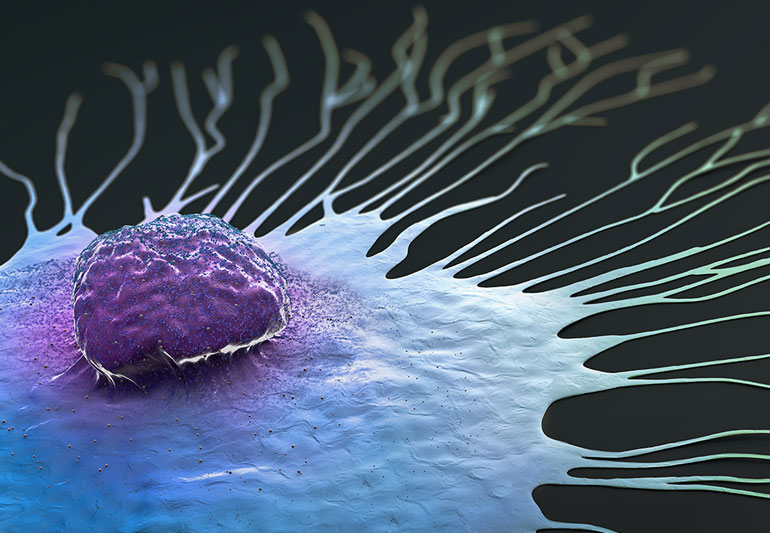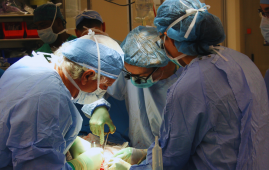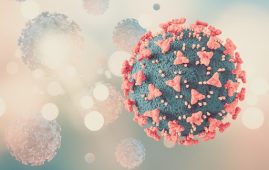

Most cancers have the ability to spread, but whether or not they do (and how fast they spread) depends on a few factors. For breast cancer, the no. 1 way for your doctor to determine how fast your cancer is likely to spread (if at all) comes down to what type of breast cancer you actually have.
“Different types of breast cancer grow at different rates,” explains oncologist Erin Roesch, MD. “It’s difficult to give an overall estimate for how fast breast cancer will spread because every cancer diagnosis is different.”
Here’s a look at what factors may contribute to the spread of breast cancer, plus the outlook for slowing and preventing growth.
How long does it take breast cancer to grow?
“Every type of breast cancer varies based on individual factors and subtypes,” says Dr. Roesch.
Different types of breast cancer tend to behave differently, and because every cancer is different – and every person is too – it’s hard to say exactly how quickly breast cancer can grow and spread. Still, experts understand that some types of breast cancer tend to be more aggressive and fast-moving, while other types typically move slower.
The speed of breast cancer growth can be influenced by these factors:
- Breast cancer subtype. In general, triple-negative and HER2-positive tumors tend to grow more rapidly, while hormone receptor-positive breast cancers tend to be slower moving.
- The stage. Breast cancer is typically given a stage from 0 to IV. Non-invasive means cancer has remained within the milk ducts or lobules in the breast and is referred to as stage 0. Invasive breast cancer means the cancer cells have broken through and grown into the breast tissue, and have the potential to spread elsewhere. Stage IV means cancer has spread to other organs. Cancer that has spread to other parts of the body is more likely to continue to spread.
- The grade. When you’re diagnosed with breast cancer, your doctor will give your cancer a grade from 1 to 3 based on how much your cancer cells resemble normal cells. A higher grade means a more aggressive tumor and possibly a higher chance that cancer will grow and spread to other areas of your body.
- Age. Younger women tend to have more aggressive types of breast cancer compared to older women. Older women are more likely to develop hormonally-driven types of breast cancer, which tend to be slower moving, but not always.
- Genetic mutations. If breast cancer is hereditary, your risk of breast cancer increases. Some women with these genetic mutations have a higher risk of developing breast cancer at a younger age, which we know tends to cause more aggressive forms of breast cancer.
Your cancer team will determine how likely or fast your breast cancer may spread based on your breast cancer subtype, stage, and individual factors. Although breast cancer experts can hypothesize and estimate the speed of cancer growth, every breast cancer is different and distinctive to that person.
Can you tell when exactly my breast cancer started?
“Oftentimes, one of the most frequently asked questions I get when someone is diagnosed with breast cancer is ‘when did it begin?’” says Roesch. “And the general rule is that we really can’t tell for sure when cancer popped up. We can look at the subtype of breast cancer to perhaps get a better understanding if it was weeks vs. months for example, but there’s no way to tell for sure.”
Can you do anything to prevent or slow the spread of breast cancer?
Like any type of cancer, there are factors that can put you at higher risk. For breast cancer, these include things like smoking, unhealthy diet, lack of exercise, and not performing monthly self-breast exams. It’s also important to make sure and get your annual mammogram for breast cancer screening.
Other risk factors can include using hormone-based prescriptions, how many children you’ve had in the past, getting older, and at what age you got your period and went through menopause.
“In some instances, you can’t necessarily prevent breast cancer, but you can sometimes slow it down, stop it from spreading, or reduce the size of the tumor,” says Dr. Roesch. “You can do this by taking your medications as directed, following through with treatments, going to your appointments, and being involved in your cancer care.”
You’re in control of taking your medication correctly, eating a healthy diet, participating in an exercise program, and managing stress. All of these things can contribute to a stronger physical body and better mental attitude – both of which can have a positive impact on your breast cancer diagnosis.
Source link
more recommended stories
 Safer Allogeneic Stem Cell Transplants with Treg Therapy
Safer Allogeneic Stem Cell Transplants with Treg TherapyA new preclinical study from the.
 Autoimmune Disorders: ADA2 as a Therapeutic Target
Autoimmune Disorders: ADA2 as a Therapeutic TargetAdenosine deaminase 2 (ADA2) has emerged.
 Kaempferol: A Breakthrough in Allergy Management
Kaempferol: A Breakthrough in Allergy ManagementKaempferol, a dietary flavonoid found in.
 Early Milk Cereal Drinks May Spur Infant Weight Gain
Early Milk Cereal Drinks May Spur Infant Weight GainNew research published in Acta Paediatrica.
 TaVNS: A Breakthrough for Chronic Insomnia Treatment
TaVNS: A Breakthrough for Chronic Insomnia TreatmentA recent study conducted by the.
 First-of-Its-Kind Gene-Edited Pig Kidney: Towana’s New Life
First-of-Its-Kind Gene-Edited Pig Kidney: Towana’s New LifeSurgeons at NYU Langone Health have.
 Just-in-Time Training Improves Success & Patient Safety
Just-in-Time Training Improves Success & Patient SafetyA study published in The BMJ.
 ChatGPT Excels in Medical Summaries, Lacks Field-Specific Relevance
ChatGPT Excels in Medical Summaries, Lacks Field-Specific RelevanceIn a recent study published in.
 Study finds automated decision minimizes high-risk medicine combinations in ICU patients
Study finds automated decision minimizes high-risk medicine combinations in ICU patientsA multicenter study coordinated by Amsterdam.
 Study Discovers Connection Between Omicron Infection and Brain Structure Changes in Men
Study Discovers Connection Between Omicron Infection and Brain Structure Changes in MenA recent study in the JAMA.

Leave a Comment